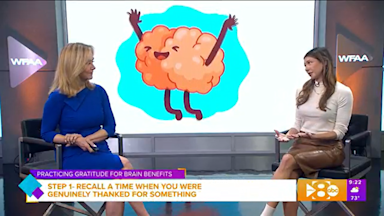Overview
In this segment, Julie Fratantoni, PhD, reveals some benefits of practicing gratitude with WFAA's Jane McGarry, including how making thankfulness a habit can increase production of the feel-good neurotransmitter serotonin, shown to enhance feelings of well-being and happiness. Neuroimaging research has shown, using fMRI brain scans, that when we remember feelings of gratitude, the brain's anterior cingulate cortex and medial prefrontal cortex activate, triggering the reward network and encouraging a positive influence on perspective and social behaviors. Dr. Fratantoni shares a simple, two-step "neuroscience way" to practice gratitude:“”

